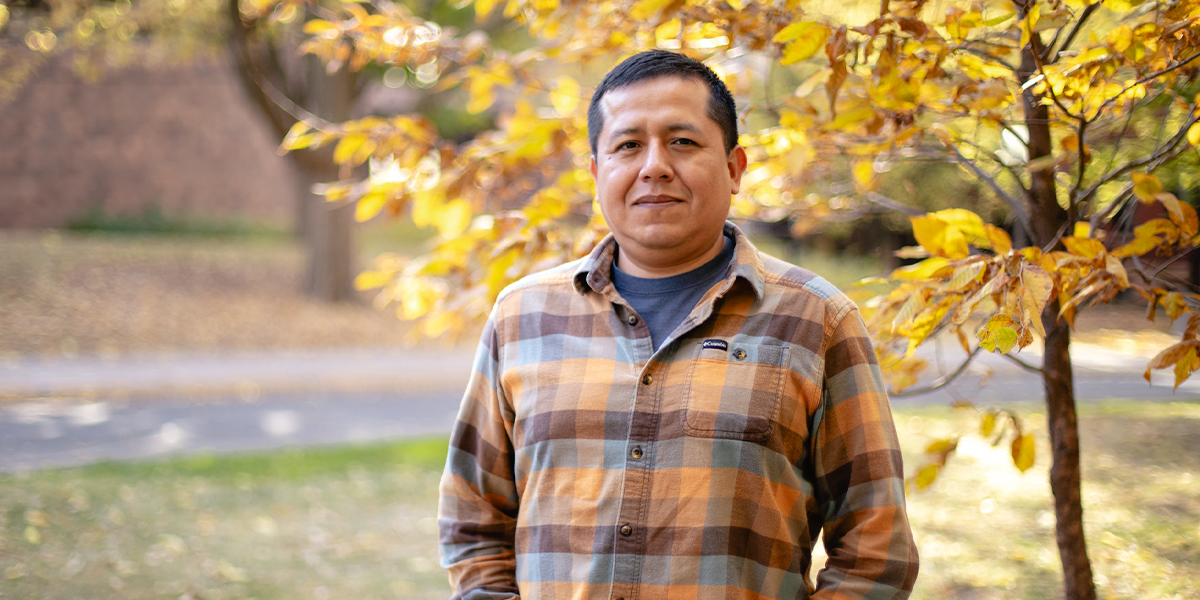
Jesús Pinto-Ledezma was working on environmental issues to inform policy-making in his home country of Bolivia when his mom first noticed how unhappy his career was making him. “It’s extremely complicated to work with policy-making because there are so many layers of government itself,” says Pinto-Ledezma. It was frustrating to say the least. “I was getting tired of that, so [my mother] told me that maybe I should start looking for another opportunity.” So he took the leap and decided to go to graduate school – instead of working in government, he hoped to focus on generating the knowledge needed to make informed decisions.
Now, as a researcher in evolutionary ecology who recently transitioned into a faculty position in the Department of Ecology, Evolution and Behavior (EEB), Pinto-Ledezma studies the origin, causes, and consequences of biodiversity at global, regional, and local scales. In particular, he’s interested in understanding what evolutionary and ecological factors might drive the distribution of a species (or number of species) and what drivers influence the assembly of ecological communities.
“I focus on using statistical and mathematical methods to help us to explain the biodiversity that we see outside,” says Pinto-Ledezma. “For example, Minnesota has so many biomes. Why do those biomes exist? Why do they have limits, and what is their species composition?” One core question he tries to answer in his research is why there’s more biodiversity of life near the equator than on the poles – which might sound simple to answer in the broader sense, but when looking at communities of life at smaller scales, the answers can get more complicated. He seeks to foster new ideas in evolutionary ecology and provide more compelling evidence for classical evolutionary theories.
Pinto-Ledezema’s first thought about pursuing research when he joined the Bolivian Air Force after high school. As he was sent from place to place to carry out tasks (on the ground, that is), he started to fall in love with the variation in Bolivian landscapes and, ultimately, it sparked an interest in biology and biodiversity. Learning about the Human Genome Project piqued his interest in life sciences even more, and he got his undergraduate degree with the hopes of doing genetics research. But since his college in Bolivia didn’t have the resources for him to move towards a career in research, he ended up moving into conservation and applied issues.
After graduating in Biology, he pursued and obtained a master's degree in Wildlife Management from the Universidad Nacional de Córdoba in Argentina. Then, he spent nearly a decade working at the Noel Kempff Mercado Natural History Museum in Santa Cruz, Bolivia, where he essentially worked on and around conservation issues and environmental policy and as a curatorial assistant in the bird collection. Some days, he would be out in the field surveying species – from plants to birds – and other days, he would be preserving specimens for safe-keeping and data collection. In that span of time he witnessed just how incredibly diverse life could be, and started deepening his knowledge about genetics, phylogenies, evolution and ecology.
“I loved spending time outside and at the museum,” says Pinto-Ledezema. “But while I was doing it, I was losing so many opportunities to do research and apply the things I was learning.” His experiences left him wanting more. After nearly a decade in applied science, working towards his Ph.D. was one of the hardest things he had to do. “When you go back to school you have to re-learn how to learn,” he says. “I wasn’t thinking in theory or reading scholarly books anymore. But with the support of my advisor and friends, I managed to do it well.”
Toward the end of his Ph.D. program, an opportunity came up to apply to the Grand Challenges in Biology postdoctoral fellowship program at the University of Minnesota. Pinto-Ledezma never planned to leave South America, but once again, his mom encouraged him to take a leap of faith. “She said, just try,” says Pinto-Ledezma.
Pinto-Ledezema worked with field-shaping ecologist Jeannine Cavender-Bares on many projects, including using spatial analysis and satellite “remote sensing” imagery to create a predictive model of species distribution and community composition. Now, on a broad scale, he tends to answer his research questions by exploring data sets that already exist.
“I look at the geographic ranges of species across a region, or examine phylogenetic trees created by other people,” he says. But he’s also interested in understanding his work in the more “micro” scale – in his role in the EEB, he gets to work with collaborators in the context of the long-term ecological experiments at Cedar Creek Ecosystem Science Reserve. There, plant and ecosystem functioning measurements are generated across many scales, with many methods, at most times of the year.
Now, he says, after seven years in Minnesota as a postdoc he’s so glad he took the opportunity to grow and establish his career here. It absolutely made sense to apply for a faculty position – to him, the community and collaborative energy within the college felt healthy, encouraging and meaningful. He also loves how the change of seasons in the midwest reminds him nothing is permanent – if he meets a challenge, it will pass.
“The last time my mom came here was in May,” he says. “She always tells me the truth. And she looked at me and said, ‘you are finally happy.’ And she was right. I feel like home.” – Adara Taylor